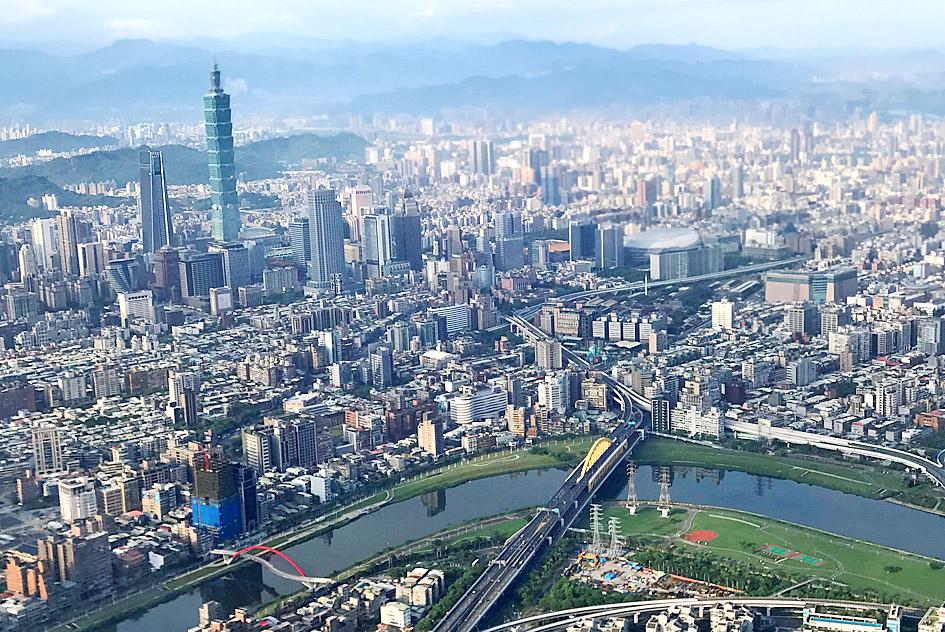The population of Taipei last year fell to the lowest in 23 years due to high rent, more transportation options and the expansion of northern cities into a single metropolis, academics and city officials said on Monday.
Data released this month by the Ministry of the Interior showed that the capital was home to 2,602,418 people last year, down 42,623 from 2019.
The decline is second only to 1993, when the population fell by 42,828 people, while Taipei’s population was the lowest it has been since 1997.

Photo: Tyrone Siu, Reuters
Taipei saw the biggest drop among the six special municipalities, while Taoyuan led the group in population increase, adding 19,770 people.
The figures are not unusual, as Taiwan’s population is declining, said Chen Liang-chuan (陳亮全), a former professor in the Department of Urban Planning and Disaster Management at Ming Chuan University in Taipei.
As rent and early education costs in Taipei are the nation’s highest, “it is difficult for young people to start families here,” he said.
Taipei Department of Civil Affairs statistics show that the difference between the number of births in 2019 and last year was less than 2,500, but more than 34,000 people moved away, which shows that the population decline was due to societal, not natural factors.
Wu Chung-hsing (吳重信), head of population policy at the civil affairs department, said that the exodus is to be expected.
Given the population density in Taipei, public transportation expansion and flexible real-estate options, it is natural that people would move to New Taipei City, Taoyuan or other places where housing is cheaper, Wu said.
In a 2019 survey, the civil affairs department found that most former Taipei residents moved to New Taipei City’s Tamsui (淡水) or Sanchong (三重) districts, he said.
Rezoned areas near Banciao, Jiangzicui, Xinzhuang Fuduxin and other stations on the MRT lines linking Taipei, New Taipei City and Taoyuan are also popular, he said.
However, the population movement would gradually stabilize as the nation’s northern cities combine into a single metropolis, Wu said.
What was previously the “Taipei-Keelung” area has already expanded to include New Taipei City, he said, adding that Taoyuan would likely be absorbed next.
Chung Hua University professor Tu Tze-chen (杜紫宸) said that population shift away from Taipei was likely due to housing and transportation costs.
In New Taipei City’s Tucheng (土城) and Sindian (新店) districts alone, homes are NT$150,000 to NT$200,000 cheaper per ping (3.31m2) than in Taipei, Tu said.
New Taipei City and Taoyuan are the most attractive options for Taipei residents seeking to move, as land is limited in Keelung, while Yilan County is not favored, as traffic on the Chiang Wei-shui Memorial Freeway (Freeway No. 5) is often congested, he said.

The first global hotel Keys Selection by the Michelin Guide includes four hotels in Taiwan, Michelin announced yesterday. All four received the “Michelin One Key,” indicating guests are to experience a “very special stay” at any of the locations as the establishments are “a true gem with personality. Service always goes the extra mile, and the hotel provides much more than others in its price range.” Of the four hotels, three are located in Taipei and one in Taichung. In Taipei, the One Key accolades were awarded to the Capella Taipei, Kimpton Da An Taipei and Mandarin Oriental Taipei. Capella Taipei was described by

EVA Airways today confirmed the death of a flight attendant on Saturday upon their return to Taiwan and said an internal investigation has been launched, as criticism mounted over a social media post accusing the airline of failing to offer sufficient employee protections. According to the post, the flight attendant complained of feeling sick on board a flight, but was unable to take sick leave or access medical care. The crew member allegedly did not receive assistance from the chief purser, who failed to heed their requests for medical attention or call an ambulance once the flight landed, the post said. As sick

Minister of Economic Affairs Kung Ming-hsin (龔明鑫) yesterday said that private-sector refiners are willing to stop buying Russian naphtha should the EU ask them to, after a group of non-governmental organizations, including the Centre for Research on Energy and Clean Air (CREA), criticized the nation’s continued business with the country. While Taiwan joined the US and its Western allies in putting broad sanctions on Russia after it invaded Ukraine in 2022, it did not explicitly ban imports of naphtha, a major hard-currency earner for Russia. While state-owned firms stopped importing Russian oil in 2023, there is no restriction on private companies to

INDUSTRY: Beijing’s latest export measures go beyond targeting the US and would likely affect any country that uses Chinese rare earths or related tech, an academic said Taiwanese industries could face significant disruption from China’s newly tightened export controls on rare earth elements, as much of Taiwan’s supply indirectly depends on Chinese materials processed in Japan, a local expert said yesterday. Kristy Hsu (徐遵慈), director of the Taiwan ASEAN Studies Center at the Chung-Hua Institution for Economic Research, said that China’s latest export measures go far beyond targeting the US and would likely affect any country that uses Chinese rare earths or related technologies. With Japan and Southeast Asian countries among those expected to be hit, Taiwan could feel the impact through its reliance on Japanese-made semi-finished products and